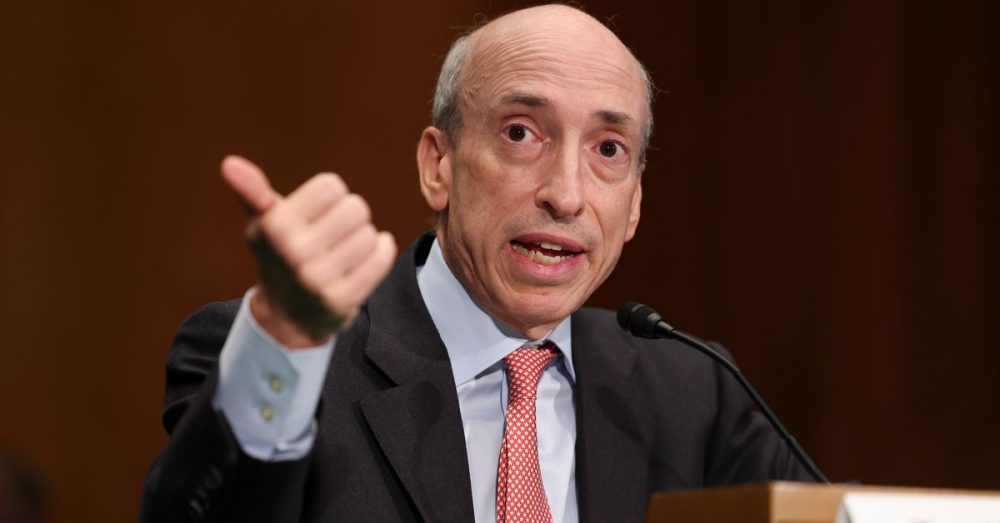Blockchain Association lawyer Marissa Coppel announced this morning that the trade group had filed a Freedom of Information Act request with the Securities and Exchange Commission (SEC), seeking records relevant to Prometheum, a crypto broker. Prometheum co-CEO Aaron Kaplan spoke before the House Financial Services Committee on Tuesday, broadly in support of the Gary Gensler SEC’s positions on crypto regulation.
Given that Prometheum is not widely known, Kaplan’s appearance led to further scrutiny of the startup. Findings based on public records have since raised questions about the nature of Prometheum’s business practices and relationships.
Above all, many have questioned whether Prometheum has been accurate in presenting itself as a fully regulated crypto exchange, a claim that supports the SEC’s ongoing enforcement agenda. Despite this self-characterization, Prometheum is not currently operational, and there are major unanswered questions about its path forward.
Coppel wrote that the Blockchain Association’s decision to seek more information was driven by growing suspicions around Prometheum.
“In the midst of aggressive SEC enforcement, Prometheum [received] approval for first-of-its-kind Special Purpose Broker-Dealer (SPBD) for digital asset securities,” she wrote. Then “The CEO somehow gets a seat in front of Congress and argues that Prometheum represents the compliant path for digital assets.”
But, Coppel continued, “Prometheum’s claims are nonsense and NOT evidence of a path to compliance … Prometheum’s ATS will not be able to trade any tokens – despite their claims to the contrary – unless projects first register with the SEC.”
At present, Prometheum is not operational, and in a recent interview with CoinDesk could not identify assets it intended to trade when it opened.
Coppel characterized these and other findings about Prometheum as “suspicious.” Some crypto leaders have speculated that Prometheum’s appearance before Congress represented a tactical effort to support the SEC’s positions in Tuesday’s hearing.
Analyst Adam Cochran and venture capitalist Matt Walsh lit the fuse on suspicions about Prometheum with a pair of dives into public information about the firm. They included suggestions that Prometheum had obtained funding from unconventional sources, and had at one point planned to launch its own token.
Also notable is that Prometheum’s leadership includes Aaron Kaplan, his brother Benjamin Kaplan, and their father Martin Kaplan. Aaron Kaplan, who testified before Congress as a securities law expert, earned his law degree from Thomas Jefferson Law School. Walsh pointed out that while “the Kaplan’s are being held up as security law experts,” the school’s national accreditation was stripped by the American Bar Association in 2019, over concerns including the academic program there. Benjamin Kaplan also earned his J.D. from Thomas Jefferson, according to biographical information posted by the family law firm, Gusrae Kaplan.
Walsh described his findings as “beyond bizarre.” They would seem to fit the general theory that Prometheum was given standing to testify before Congress because they were saying things that authorities wanted to hear, rather than because they were prominent, influential, knowledgeable – or successful at running a crypto business.
Andrew Bailey, Associate Professor at Singapore’s Yale-NUS College and part of the Resistance Money crypto research group, summed up three possible interpretations of the situation. At worst, some will see conspiracy. But Prometheum may also simply be an unserious operation that got lucky.
At least one prominent voice in the crypto-regulatory world, lawyer Preston Byrne, dismissed conspiratorial speculation, writing that:
“Aaron [Kaplan] has been working on Prometheum since at least 2015, comes from a family of lawyers … and has a view on tokens consistent with that background. There’s nothing fishy, it’s just nobody noticed him until this week.”
The company couldn’t be reached for a comment as of press time.







